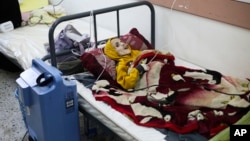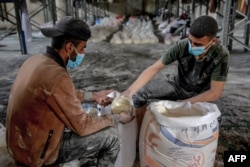The United Nations human rights commissioner said Tuesday that the looming famine in the Gaza Strip is the result of Israel's restriction on the entry and distribution of humanitarian aid, and he warned it could amount to a war crime.
"The extent of Israel's continued restrictions on the entry of aid into Gaza, together with the manner in which it continues to conduct hostilities, may amount to the use of starvation as a method of war, which is a war crime," Volker Türk said in a statement.
His comments come a day after a U.N.-backed report said 1.1 million Palestinians in Gaza are facing catastrophic hunger. The Integrated Food Security Phase Classification report said famine could occur at any time in the coming weeks, with an estimated 210,000 people in northern Gaza facing the most catastrophic danger.
"Israel, as the occupying power, has the obligation to ensure the provision of food and medical care to the population commensurate with their needs and to facilitate the work of humanitarian organizations to deliver that assistance," the high commissioner said.
He said Israel must also ensure that Gazans can access aid in a safe and dignified manner.
"The clock is ticking," Türk warned. "Everyone, especially those with influence, must insist that Israel acts to facilitate the unimpeded entry and distribution of needed humanitarian assistance and commercial goods to end starvation and avert all risk of famine."
Israel says it facilitates the entry of humanitarian aid to Gaza via land, air and sea in accordance with international law and does not limit the amount of food that can enter Gaza. It blames the U.N. and its partner agencies for not distributing it fast enough inside the territory.
The U.N. Office for the Coordination of Humanitarian Affairs, or OCHA, said Tuesday that it is continuing to experience access constraints in delivering aid, especially to hundreds of thousands of people in northern Gaza.
In the first two weeks of March, OCHA said, Israel facilitated less than half of planned aid missions to northern Gaza — 11 out of 24. The rest were either denied or postponed.
"As OCHA has stressed repeatedly, we need the Israeli military to guarantee safe, sustained and unhindered access across Gaza and to open up all possible entry points into Gaza," U.N. deputy spokesperson Farhan Haq told reporters. "The only way to deliver aid on a large scale — and at the scale required to avert imminent famine — is by road."
COGAT, the Israeli authority coordinating aid into Gaza, says on its website that 222 aid trucks were inspected and transferred to Gaza on Monday. A privately operated convoy of 20 food trucks also went to the north. But the World Food Program says its agency alone needs at least 300 trucks each day to enter Gaza and distribute food, especially in the north, which has been cut off from regular aid deliveries.
U.N. officials have repeatedly called for a humanitarian cease-fire to get aid in and the hostages held by Hamas out.
The International Court of Justice in late January ordered Israel to take immediate measures to protect Palestinians in Gaza, including ensuring adequate humanitarian assistance and basic services.
Even before Hamas' October 7 terror attack inside Israel triggered this latest war, Gazans struggled with a 16-year-old Israeli blockade on the Hamas-run territory, which caused economic hardship for many Palestinians. The U.N. estimates that 1% of Gazans faced acute malnutrition during that period. That surged to as much as 9% in January and nearly doubled in February.












